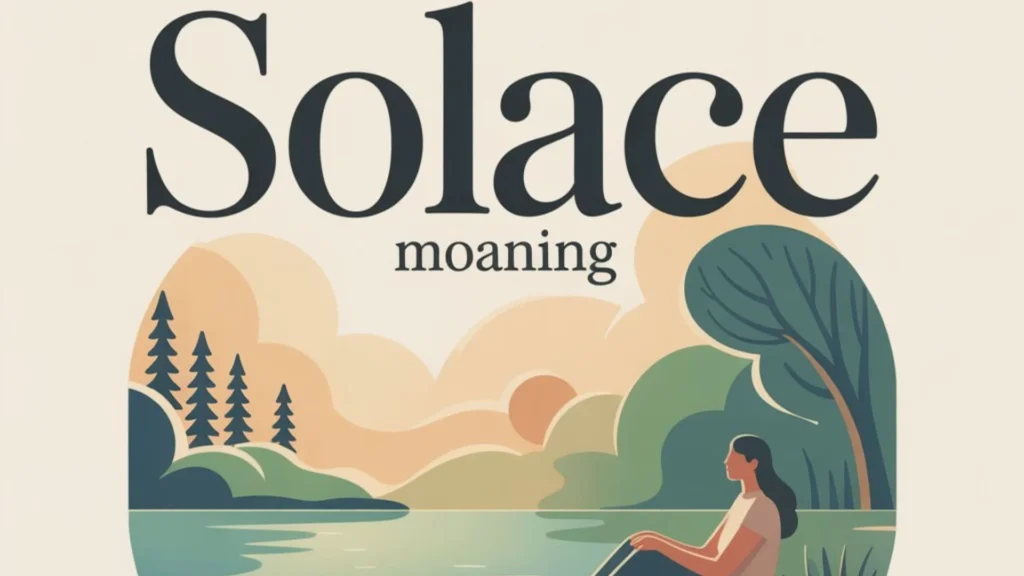Language often carries words that embody more than just definitions—they hold emotions, comfort, and history within them.
One such powerful word is “solace.” At its core, solace represents comfort in times of distress, a sense of relief when burdens feel heavy, and a reassuring presence when everything seems uncertain.
People seek solace in different ways—through companionship, faith, art, or even silence. Understanding this word not only enhances your vocabulary but also deepens your appreciation for human experiences of healing and empathy.
Whether you’ve encountered it in literature, conversations, or social media posts, knowing what solace truly means helps you connect better with emotions and expressions of others.
In this article, we will explore the meaning of solace, its historical origins, diverse applications, common misconceptions, synonyms, and FAQs to give you a complete perspective.
Solace Definitions & Meaning

The word solace is primarily defined as comfort or consolation in times of grief or distress. It acts as both a noun and a verb:
- Noun: A source of comfort during sadness (e.g., “Music was her only solace after the loss”).
- Verb: To console or give comfort (e.g., “He tried to solace his friend in sorrow”).
In literature and everyday use, solace is tied to emotional relief. Unlike simple happiness, solace carries depth—it does not erase pain but provides a cushion against it.
For example, someone mourning might find solace in memories, rituals, or supportive words from loved ones.
Philosophically, solace is considered a bridge between despair and healing. It suggests that even in the darkest times, a source of peace can be found, no matter how small.
This meaning resonates deeply across cultures, religions, and personal experiences, making solace a universal concept of comfort.
What “Quantum of Solace” Really Means — A Deep, Rank-Ready Explanation
“Quantum of Solace” is a phrase that sounds mysterious, poetic, and scientific — and it is all of those things. But at its core, the term doesn’t refer to a physical object or place. Rather, it expresses an emotional threshold — the smallest measurable amount of comfort or emotional relief someone can have in a relationship after trust has been damaged.
Literal Breakdown of the Phrase
- Quantum → Scientific term meaning a specific, measurable amount (from physics).
- Solace → Emotional comfort, consolation, or relief during pain or distress.
Together: the minimum amount of comfort required to maintain emotional stability or hope in a relationship.
Origins & History Of Solace

The word solace traces its roots back to Middle English (13th century) from the Old French solas, derived from the Latin solacium meaning “comfort” or “consolation.”
In medieval texts, it often referred to emotional relief or enjoyment in both sacred and secular contexts.
During the Middle Ages, solace was used in religious writings to describe divine comfort provided by faith in God.
Poets of the Renaissance, such as Geoffrey Chaucer, employed the term to depict comfort from love or companionship.
Shakespeare frequently used words akin to solace to illustrate emotional refuge, often in moments of grief.
Over centuries, the word’s essence has remained remarkably consistent.
From religious sermons to romantic poetry, solace has always stood as a timeless human need—the pursuit of comfort amid suffering.
Today, while it retains its classical connotations, its use has expanded into modern contexts like therapy, wellness, and even digital communities where people seek emotional support.
Usage in Different Contexts Of Solace

1. Solace Meaning in Love
Writers use solace to illustrate characters’ journeys through grief and healing. For instance, in classic novels, solace often appears as the comfort found in nature, love, or personal reflection.
2. Social Media & Online Culture
On platforms like Twitter or Instagram, people express finding solace in hobbies, friends, or even memes. Quotes such as “Books are my solace” or “Music gives me solace” trend frequently, showing its modern relevance.
3. Professional & Counseling Environments
In psychology and counseling, solace is often framed as part of coping strategies. Therapists encourage clients to seek solace in mindfulness, journaling, or community support groups.
4. Spiritual Solace Meaning
In many faith traditions, solace is associated with prayer, meditation, and divine reassurance. Religious texts often describe solace as the spiritual peace granted by God or higher powers.
5. Pop Culture & Entertainment
From movies to songs, the concept of solace frequently emerges. For example, films portray characters finding solace in companionship, while music albums often include tracks about healing and comfort.
Common Misunderstandings & Clarifications Of Solace

- Solace vs. Happiness – Solace is not the same as joy; it is relief from pain, not the absence of it.
- Solace as Weakness – Some assume seeking solace shows fragility. In reality, it reflects strength in embracing healing.
- Only Religious Comfort – While solace is spiritual in many traditions, it extends beyond faith to friendships, art, and self-care.
- Temporary vs. Permanent Relief – Solace doesn’t mean problems vanish; it is a moment of peace that helps endurance.
- Overuse in Casual Contexts – On social media, the term is sometimes used lightly, but its true essence carries deep emotional weight.
Alternatives & Synonyms Of Solace

Several synonyms capture shades of the word “solace.” Some include:
- Comfort – General relief from distress.
- Consolation – Offering emotional support during grief.
- Relief – A sense of easing pain or burden.
- Succor – Aid or assistance in times of hardship.
- Support – Emotional or practical help from others.
Each synonym has its nuance. While “relief” can be physical or emotional, “solace” leans strongly toward emotional comfort, making it uniquely expressive.
FAQ
1. What does solace mean in simple words?
Solace means comfort or peace during difficult times, like finding calm when you’re upset.
2. Can solace be both physical and emotional?
Primarily emotional, but it can include physical comfort, like a warm blanket or safe environment.
3. Is solace the same as sympathy?
No. Sympathy is understanding another’s pain, while solace is the relief or comfort provided.
4. How is solace used in a sentence?
Example: “After the long day, she found solace in listening to her favorite music.”
5. What is the difference between solace and relief?
Relief often relates to removing pain or stress, while solace is more about emotional reassurance.
6. Can nature provide solace?
Yes, many people find peace and comfort in nature’s beauty, such as forests, oceans, or gardens.
7. Why is solace important?
It helps people cope with grief, stress, and hardships, offering strength to move forward.
Conclusion
The word solace carries with it centuries of emotional depth, cultural resonance, and timeless relevance.
From its Latin origins to its presence in modern therapy and online communities, solace continues to be a vital expression of human need.
Unlike happiness, it does not erase pain but gently eases it, offering comfort when life feels overwhelming.
Whether found in nature, relationships, faith, or personal practices, solace reminds us of the universal desire for relief and reassurance.
By understanding its meaning, history, and application, we recognize solace as more than just a word—it’s a reflection of resilience and healing that connects us all.

Mariah Cannon is the creative mind behind Pikuplab.com, crafting engaging, high-ranking content with expertise and precision.
With a talent for turning ideas into impactful words, Mariah brings value to every article.

